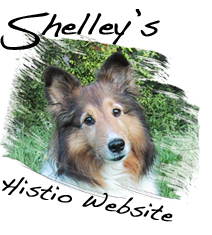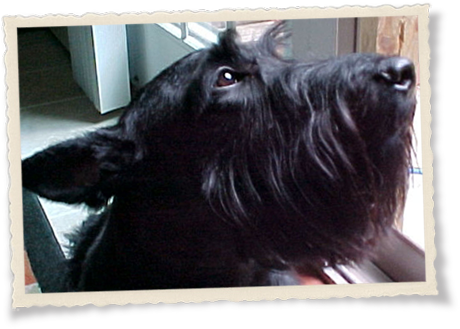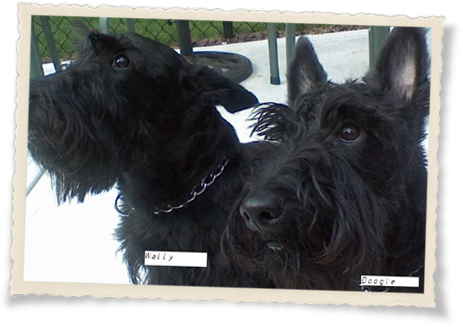
HOME
 YOUR HISTIO STORY
YOUR HISTIO STORY
I am looking for similarities
in all individual cases of
Histiocytic diseases.
I wonder if we all tell our
stories we might come up
with some commonality
between the specific
situations in which all of
our pets got this disease.
So please email me the
details and I'll put your
pets story on Shelley's
Histio Website
 UW HISTIO VERHAAL
UW HISTIO VERHAAL
Ik ben op zoek naar
overeenkomsten in alle
individuele gevallen van
Histiocytose.
Ik hoop dat wanneer wij
onze Histio verhalen
vertellen, wij overeen-
komsten ontdekken over
de manier waarop onze
huisdieren deze ziekte
hebben opgelopen.
Stuur mij de details en
ik zal het verhaal van uw
huisdier op de Histio
website van Shelley zetten.
 WARNING !
WARNING !
These stories are all
different. Individual
symptoms, situations
and circumstances
may vary and response to
therapy is not always the
same.
- Disclaimer -
 WAARSCHUWING !
WAARSCHUWING !
Deze verhalen zijn allemaal
verschillend. Individuele
symptomen, situaties en
omstandigheden kunnen
verschillen en de reactie
op therapie is niet altijd
hetzelfde.
- Disclaimer -
HISTIOCYTOSIS IN
OTHER LANGUAGES
German - Hund
Maligner Histiozytose
French - Chien
l'Histiocytose Maligne
Italian - Canis
Maligni Histiocytosis
Spanish - Perros
Histiocitosis Maligna
Dutch - Hond
Maligne Histiocytose
HOME
MacDougall
Malignant Histiocytosis
Scottish
Terrier
Male
December 22, 2000 / October 24, 2008


First I want to begin by telling you what an immense help and comfort your web page, and all the stories on it, was to me when my dog, MacDougall, was diagnosed with histiocytosis. Here is my story.
We lost our most precious MacDougall at 7 1/2 years of age on October 24, 2008. Doogie was my very best friend. We got him on Valentines Day in 2001 as a gift for our two girls, although he became the best gift I ever got! The other puppies showed no interest and romped around with themselves, but MacDougall followed me around and chewed on my shoe and showed me he wanted to come home with me. It was love at first sight. At eight weeks old, he was a wonderful puppy and he grew into a wonderful dog. It is very hard for me to write this as I think of the most horrible affliction that overcame him in his last weeks.
Doogie was always a great companion. He was obedient, loved people, other animals and children and was always quick to greet everyone that came to visit. He loved going on walks and going "sniffing" for chipmunks and squirrels in the yard. He was a big boned Scottie, weighing in at 32 pounds. He was very strong for his size - a big dog in a small package. When he was five, we acquired a year-old companion for him through Scottish Terrier Rescue. He and his buddy, Wally, would play and sleep together, but Doogie was always Mommy's boy and he was always by my side. He didn't want Wally to play too much with his masters, so he would come and take the toy away when he thought Wally was getting too much attention!
Around May of 2008, I noticed MacDougall slowing down a little. I also noticed that he had bad breath. He vomited a few times over about a two-month period at night. One of the times, he vomited what appeared to be a little pink blood. At this time during his yearly checkup the veterinarian assured me that sometimes animals vomit blood. He had blood work done and the vet said that one of his liver enzymes was elevated and he would have to watch it with further blood work. Also around this time he had developed a lump on his chest about an inch in diameter. The veterinarian said he didn't think it was too much to worry about and attributed it to a sebaceous cyst that dogs get as they get older. After about a week, the lump spread out to about two inches in diameter and became depressed in the middle like a donut shape. Then it went away after another two weeks. Then MacDougall got another lump on his right shoulder the same size. After about a week, the same thing happened. It became donut shaped and then disappeared. At the same time he had developed an odd set of long, raised, red, squiggly lumps on his abdomen. I noticed MacDougall's teeth would bleed when chewing a toy or playing tug of war. He didn't play as much. The vet and I scheduled a dental cleaning figuring we could find out if there was a problem with his teeth.
In July MacDougall went for a grooming. The groomer noticed some redness on his nose and when I looked, he had a long, red, raised, crescent-shaped lump running the whole length of his muzzle. After about a week, it went away. Doogie had always loved getting his belly rubbed, but he wasn't allowing me to rub it any more. He would not lay on his back any longer. He also started to limp in his right front paw, and cry when he bent down to eat. The vet attributed this to most likely arthritis. MacDougall was having trouble on his walks, limping and sometimes falling. By August, he wasn't playing with Wally any longer and was snapping when Wally went near him.
By the end of September, MacDougall was limping on on and off now on his hind left paw. He spent a lot of time lying around, but he still enjoyed going out for his "sniffy" walks in the yard. By the beginning of October, MacDougall broke out in a series of lumps on his body. One was on the top of his head near his eyebrows. It was a large lump about half an inch wide that ran from the left side of the top of his head across and down the right side of his cheek. This lump was not going away. He also developed two large lumps on either side of his muzzle, right under both eyes where his upper teeth were. I became concerned when Doogie wasn't acting himself. He seemed depressed. I just knew there was something seriously wrong. He also began panting more than usual at this time. On October 4, I brought him back to the vet and aired my concerns. He examined Doogie and said he had never seen anything like that before, but still reiterated that he didn't think the lumps were life-threatening and they didn't seem to hurt him. We decided to wait and see if the lumps would go away as the others did. We thought perhaps it was an allergic reaction to something.
A week later, on October 13, I brought Doogie back to the vet because the panting was increasing and he was having trouble eating his cookies. He was going off by himself to lay down most of the time. His left nostril was now swollen and blocked off and he had a lump right on top of his nose. He couldn't make it up and down the stairs most of the time and I occasionally had to carry him. I also was beginning to have to hold the bowl for him when he ate because it hurt to bend down and eat. His breathing became labored and it sounded like he was whining when he was sleeping. This time, the vet put him on prednisone, thinking it was an immune system problem. He then suggested I go to a veterinary specialist clinic in the area for a biopsy and more bloodwork.
 After a week on prednisone, Doogie wasn't improving, and was vomiting occasionally, so I took him to the veterinary specialists. They examined him and kept him there for the day for some tests, which included bloodwork, x-rays and fine needle aspirates of the lumps. When they weighed him, he had lost a pound. The vet checked his lumps and noted that his lymph node on the right side was enlarged. They told us to feed him chicken and white rice and to give him pain pills and Pepcid AC to settle his stomach. When he came home, he was absolutely not himself, in pain, and he was panting 99% of the time. He couldn't get comfortable in his bed at night and spent most of the night sitting up. I also noticed the white of his left eye had become bloody and his eye was droopy. He also developed swelling on the front of his throat. On October 21, I got the results back from the testing. MacDougall's bloodwork was normal with the exception of the liver enzyme being elevated. The worst part was that the x-rays showed fluid in his abdomen and lungs and a mass in the media steinum. The vet thought it could be T-cell lymphoma but was waiting for the results of the fine-needle aspirates and consultation with the oncologist. My husband and I started considering chemotherapy for him, knowing at best his chances were just about six months longer.
After a week on prednisone, Doogie wasn't improving, and was vomiting occasionally, so I took him to the veterinary specialists. They examined him and kept him there for the day for some tests, which included bloodwork, x-rays and fine needle aspirates of the lumps. When they weighed him, he had lost a pound. The vet checked his lumps and noted that his lymph node on the right side was enlarged. They told us to feed him chicken and white rice and to give him pain pills and Pepcid AC to settle his stomach. When he came home, he was absolutely not himself, in pain, and he was panting 99% of the time. He couldn't get comfortable in his bed at night and spent most of the night sitting up. I also noticed the white of his left eye had become bloody and his eye was droopy. He also developed swelling on the front of his throat. On October 21, I got the results back from the testing. MacDougall's bloodwork was normal with the exception of the liver enzyme being elevated. The worst part was that the x-rays showed fluid in his abdomen and lungs and a mass in the media steinum. The vet thought it could be T-cell lymphoma but was waiting for the results of the fine-needle aspirates and consultation with the oncologist. My husband and I started considering chemotherapy for him, knowing at best his chances were just about six months longer.
The results of the fine needle aspirates came back on the 22nd as inconclusive, but in consultation with the oncologist, he determined it was not T-cell lymphoma, but rather systemic histiocytosis, which we were then told is incurable. They suggested an ultrasound and biopsy and drawing of the fluid from his stomach and lungs to test it. They also suggested we could try chemo, but said it wasn’t guaranteed.
On October 24, when we were about to bring him back for further testing, he took a turn for the worse. When I went to get him from his bed in the morning, he was covered in diarrhea. I gave him a warm bath and although he hated baths, he sat still and tolerated it. After, when I let him out to relieve himself, his diarrhea was bloody. When I tried to feed him his favorite meal, chicken, he didn't eat. He laid down and was basically unresponsive. When I laid down next to Doogie to rub him, he looked at me and whined. In under a month’s time, MacDougall had become a shell of his former self. I knew at that point, he was telling me it was time for him to go. I took him for one last "sniffy" walk which he could barely do, and then with tears in our eyes, my husband and I took him back to the veterinary specialist and told him how much we loved him and what a good boy he was while he fell asleep in my arms.
We are at a loss to understand how this affliction is basically obscure, and how short a time it took to kill our beloved Doogie. We want to tell our story so perhaps if we spread the word there can someday be more recognition and a cure for this most horrific killer!
We love and miss our MacDougall very much. He will always be in our hearts. Thank you for letting us share our story.
Donna and Tony Morena

